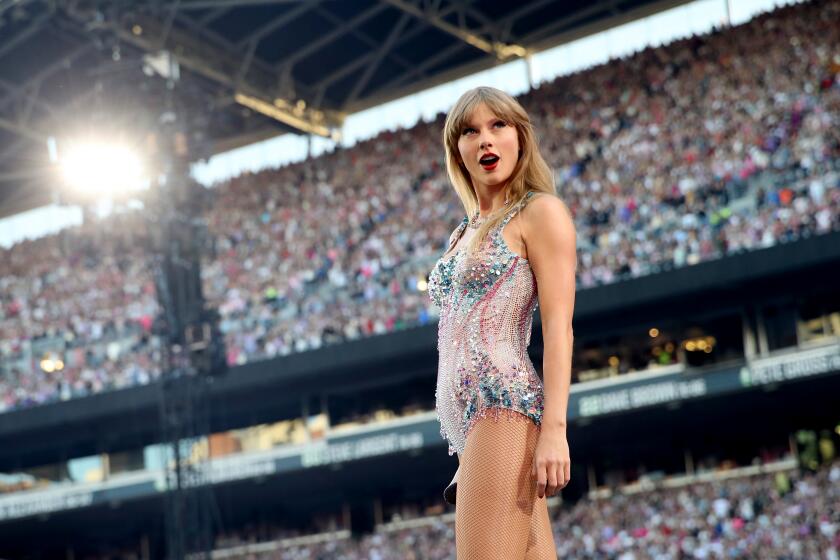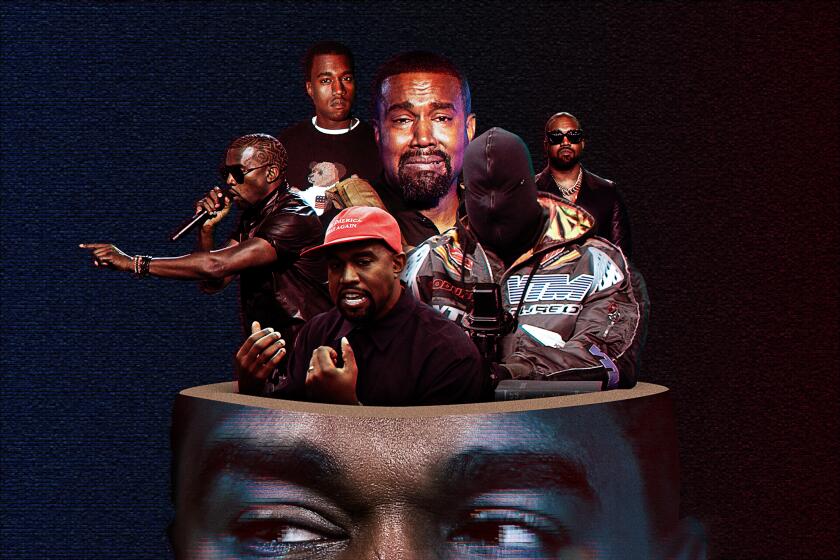On 15th anniversary of Kanye’s VMAs interruption, will Taylor Swift rerelease ‘Reputation’ as ultimate rebuttal?

- Share via
When you think of infamous pop culture moments, chances are that Kanye West interrupting Taylor Swift’s acceptance speech at the 2009 MTV Video Music Awards comes to mind. West’s instantly and enduringly memeable words — “I’mma let you finish …” — still reverberate 15 years after he declared that Beyoncé’s “Single Ladies” was deserving of the Moonman for female video.
Later in the show, Queen Bey won video of the year and invited Swift back onstage to claim her moment in the sun.
The wide-eyed 19-year-old Swift donned an off-the-shoulder sequin Kaufmanfranco gown. She had arrived on the red carpet in a pumpkin-shaped horse-drawn carriage.
Up until that point, Swift was a country singer-songwriter making her crossover into pop, cemented by the success of her sophomore album, “Fearless,” which went on to win album of the year at the Grammys and spawned such hits as “Love Story” and “You Belong With Me.”
Swift’s 11th studio LP, ‘The Tortured Poets Department,’ released at midnight Eastern time, follows a busy period in the 34-year-old’s personal and professional spheres.
“Taylor often played the part of a damsel in distress or an overlooked romantic interest using theatrical costuming,” writes Sarah Chapelle in “Taylor Swift Style” — out Oct. 8 — a spinoff of her popular Instagram account of the same name.
With this year’s VMAs and the anniversary looming, will Swift stage the ultimate clapback by dropping the long-awaited “Taylor’s Version” of her West revenge album, “Reputation,” to mark the occasion?
It’s no coincidence that multiple books about Swift — including Rolling Stone journalist Rob Sheffield’s “Heartbreak Is the National Anthem: How Taylor Swift Reinvented Pop Music” (Nov. 12), “Long Live: The Definitive Guide to the Folklore and Fandom of Taylor Swift” by Nicole Pomarico, “Invisible Strings: 113 Poets Respond to the Songs of Taylor Swift” edited by Kristie Frederick Daugherty (both Dec. 3) and a Hearst Home gift book (Oct. 1) — are being published around the 15th anniversary of when West claims he made her famous, as per the lyrics of his 2016 song “Famous.” The viral video for the track featured naked wax figures of Swift, West, his then-wife Kim Kardashian, Donald Trump and others in bed together. To paraphrase Sheffield in “Heartbreak Is the National Anthem,” West and Trump are just two of the “men who’ve singled her out and made her a personal pursuit.” Trump recently posted a fake presidential endorsement from the singer.
Since West’s inebriated decision to crash Swift’s celebration that fateful night in 2009 catapulted her to a new level of fame (“Who won Best Female Video the year before Swift, or the year after?” Sheffield asks in the book), they’ve continuously, often unwillingly, been intertwined in one way or another.
At the following year’s MTV VMAs, Swift performed the song “Innocent” in which she ostensibly forgave West for simultaneously ruining her moment and elevating her status.
Cultural dominance. History-making album sales. Sold-out stadiums. Add them up, and Taylor Swift’s current moment has little precedent in pop-music history.
By 2015, it appeared as though the two had buried the hatchet, and in an ironic twist, she presented her “friend” West with the Video Vanguard Award at the VMAs. Swift was riding high on the success of her first fully fledged pop album, “1989,” and was, by all accounts, overexposed. She told NME magazine in October 2015, “I think people might need a break from me.”
That break wouldn’t exactly be self-imposed: After West released “Famous,” Swift publicly rejected the song. “I would very much like to be excluded from this narrative, one that I have never asked to be a part of, since 2009,” she responded on Instagram. Kardashian countered by posting to Snapchat edited portions of a phone call between West and Swift in which he told Swift about the content of the song and she appeared to sign off on it. (The full recording of that phone call leaked in early 2020 and largely backed up Swift’s claim that she didn’t know about the contentious “I made that b— famous” line.) Public consensus turned swiftly against her and she exiled herself to write “Reputation,” arguably her most vengeful album, replete with serpentine iconography, “versions” of herself that she would revisit in the “Anti-Hero” video and the Eras tour, and a questionable video for the lead single “Look What You Made Me Do” that saw Swift making finger guns in a bathtub full of diamonds. (Kardashian had been robbed at gunpoint in Paris the year prior with her assailants sequestering her in a bathtub.)
It’s an aspect of Swift’s personality and artistry, which are inextricable, that Sheffield characterizes as “petty Taylor.”
“It’s one of the things about her that we don’t necessarily want to identify with, but nonetheless many of us do,” he tells The Times. “One of the many ways she goes to emotional extremes that listeners don’t necessarily enjoy identifying with.”
From there, Swift bounced back stronger, embarking on a rerecording effort to regain ownership of her earlier albums while also entering a period of peak creative output, releasing five original studio albums between 2018 and 2024, two of which were bestowed the album of the year Grammy (“Folklore” and “Midnights”), adding to her existing haul for “Fearless” and “1989” and making her the only artist to win that honor four times. She’s now reached dangerously 2015 levels of overexposure with her record-breaking Eras tour, her latest Grammy wins, release of double album “The Tortured Poets Department” earlier this year and highly publicized relationship with Kansas City Chiefs tight end Travis Kelce.
West hit a new low Thursday by appearing on Alex Jones’ show with white supremacist Nick Fuentes. What’s behind his spiral from hip-hop hero to far-right troll?
Pointedly, “Reputation” remains the last album in her back catalog to warrant a “Taylor’s Version.” One can’t help but assume that the woman who kept a photo on her living room wall of her and West’s tussle — captioned in her own handwriting with “Life is full of little interruptions” — is saving her revenge anthems about West for the crystal anniversary. After all, it did occur on the 13th, long established as a significant number in Swift’s life.
“Delaying the announcement of ‘Reputation’ the way she has has been an example of her playful and malicious side,” Sheffield laughs.
Pomarico says we shouldn’t be so quick to “clown” — a term Pomarico refers to as looking too deeply into the copious Easter eggs Swift leaves for fans in her lyrics, videos, outfits and liner notes; Swift concluded the latter practice with “Reputation” — and assume that the anniversary will herald “Reputation (Taylor’s Version).”
“I have been burned so many times trying to predict when ‘Reputation (Taylor’s Version)’ is going to come out that I don’t want to jinx anything by clowning again!” she tells The Times. “But on the other hand, that’s part of the fun — even when you’re wrong, it’s more about the excitement that comes with creating fan theories and waiting to see if they come true.”
Feeding into the narrative she claimed she wanted to be excluded from is not to negate Swift’s hard work. Swift was already prodigiously mining her personal life for art before West snatched that microphone out of her hand 15 years ago and she probably would have reached a similar level of fame with or without West. Indeed, her last five, post-“Reputation” albums have had nothing to do with West. (Aside from her recent alleged Kardashian diss track “thanK you aIMee” — recently retitled “thank You aimEe” [capitalizing YE instead of KIM] in a response to the release of West’s album “Vultures 2.”)
“Should anyone judge her for however she chooses to process that experience through her music?” Pomarico posits.
Teasing out the drop of perhaps her most anticipated rerecording (she still has her self-titled debut remaining) will be the ultimate rebuttal to that fateful moment. As she announced when “Reputation” first dropped: “There will be no further explanation. There will just be reputation.”
More to Read
Sign up for our Book Club newsletter
Get the latest news, events and more from the Los Angeles Times Book Club, and help us get L.A. reading and talking.
You may occasionally receive promotional content from the Los Angeles Times.










